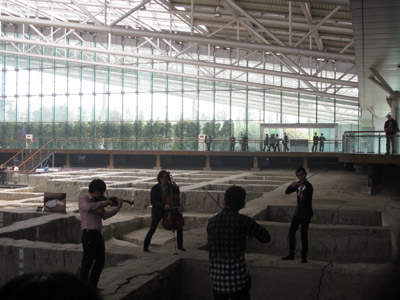Bureaus Exclusive
Soul search at 3,000-year-old site
(China Daily Sichuan Bureau)
Updated: 2011-04-13 17:31
 |
Large Medium Small |
|
 Four musicians from the Tang Quartet in Singapore gave a 10-minute performance in Chengdu, Sichuan Province, on Wednesday afternoon. [China Daily Sichuan Bureau]
|
Four musicians from the Tang Quartet in Singapore gave a 10-minute performance in Chengdu, Sichuan Province, on Wednesday afternoon.
It was unusual because the musicians performed at the site where relics at the famous Jinsha Site Museum were found.
Playing the music of Hu Xiao'ou, a 35-year-old Sichuan composer staying in the United States, the musicians were aimed at soul search and looking for human beings' spiritual homeland in the materialistic world, said Ao Changqiong, president of Sichuan Musicians Association.
A native of Chengdu, Hu composed the music "Soul Capture" performed by the Tang Quartet at the Jinsha Site Museum which houses all the relics unearthed from the Jinsha Ruins.
The Jinsha Ruins were discovered by accident.
On Feb 8, 2001, workers at a construction site in Jinsha Village, Chengdu, found ivory and jade in the piles of debris.
Archaeologists have excavated more than 5,000 precious relics, including gold, jade, bronze and stone wares, as well as a ton of elephant tusks and tens of thousands of pottery and ceramic pieces.
Archaeologists have hailed the ruins dating back to 3,000 years as Sichuan's most important find after the discovery of the Sanxingdui site in 1929.
Thanks to Sanxingdui, the consensus has been reached that the Yangtze River is also the origin of Chinese civilization.
Previously, it was held that the Yellow River was the sole origin of Chinese civilization.
| 分享按钮 |